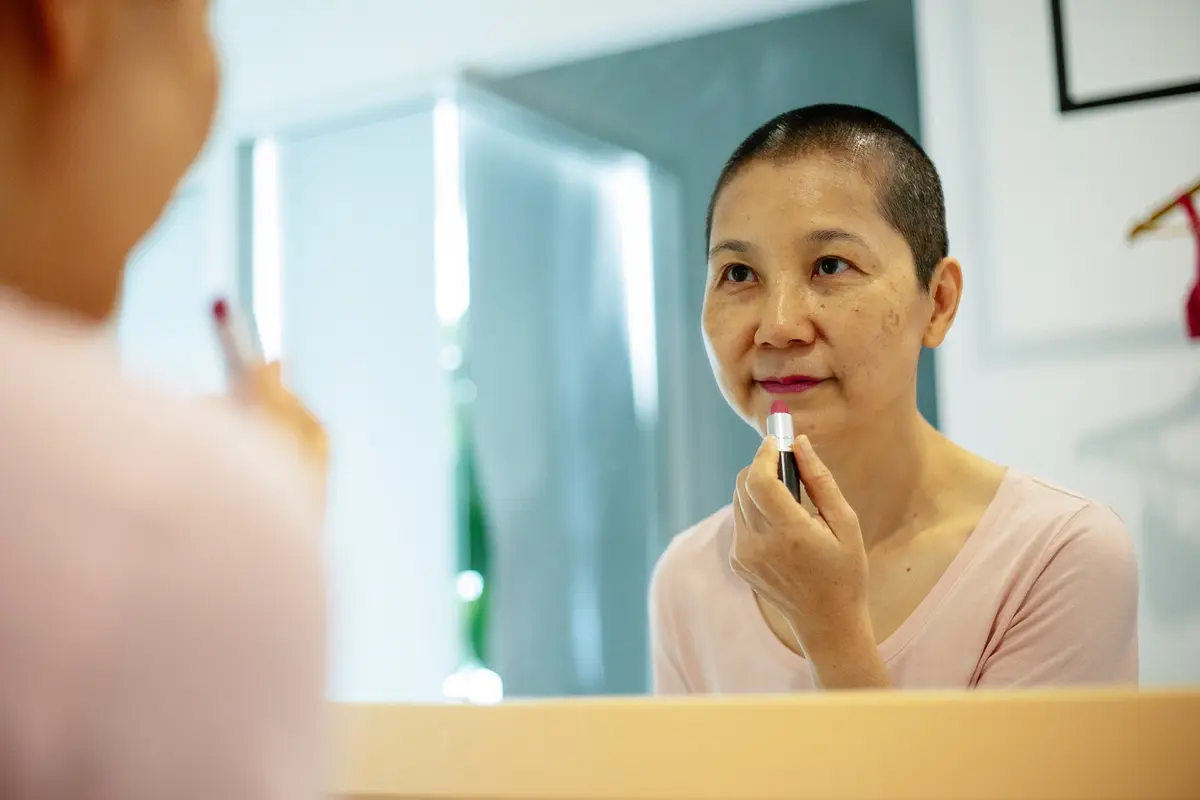Pimples, redness, acne – typical skin imperfections that plagued us during our teenage years and ones we thought we left behind with puberty. Unfortunately, the bad news is that blemished skin can still be an annoying issue in adulthood, and you can even get acne at 40. While mature skin tends to be drier and has fewer blackheads compared to adolescence, the inflammations run deeper. Here, you will learn how blemished skin actually develops and what specific causes can lead to pimples and acne in your 40s.
How does acne at 40 develop?
The key players for blemished skin are the sebaceous glands in the so-called dermis, one of the upper layers of the skin. The sebaceous glands are directly connected to the hair follicles and usually produce just the right amount of oil that can easily be transported to the skin’s surface. However, when the sebaceous glands produce too much oil – for example, when stimulated by an increased release of androgens (male sex hormones) – the hair follicles become blocked, and the pores fill up with excess sebum. Blackheads appear on the surface.
Additionally, excessive sebum production disrupts the skin’s natural acid mantle, allowing bacteria to settle in the clogged pores (an ideal breeding ground for them), leading to easier inflammation. When blackheads become inflamed, painful swellings such as red papules and pus-filled pustules form. If this development occurs in multiple areas simultaneously, it is referred to as acne.

Common causes of acne at 40
Why is your face breaking out at 40? While in teenagers, the overactivity of sebaceous glands is mainly due to the typical increased secretion of male sex hormones (androgens) during development, it can have various causes in adulthood.
1. Incorrect skincare
Despite regularly cleansing, moisturizing, and occasionally using exfoliants, many women over 40 still experience recurring skin blemishes. In many cases, the reason lies in incorrect skincare routines because the skin has different needs depending on the skin type and season. For instance, skin prone to blemishes should not be cared for with overly rich products (water-in-oil formulations). Instead, oil-in-water emulsions or gels are better options. Ingredients like dexpanthenol and niacin further soothe blemished skin.
Dermatologists also advise against using products containing mineral oil as they can clog the skin pores. Women with acne at 40 should avoid conventional soaps and cleansers with sodium laureth or lauryl sulfates as these surfactants can promote the formation of blackheads. Likewise, overly aggressive and drying skincare products are counterproductive as they strip the skin of its sebum, causing the glands to produce even more oil.
Mild creams and cleansers with few to no chemical additives typically have the least negative impact on blemished skin. Gentle cleansing products also help avoid allergic reactions to fragrances and ingredients. Ideally, a beautician or dermatologist can assess the skin and recommend suitable skincare products. Only when our skin receives the right care and sufficient moisture, its natural barrier against bacteria and pollutants functions effectively.

2. Overcare
Constantly applying creams or using too many different skincare products (“polypragmasia” = the haphazard treatment with various remedies) does not do the skin any favors. At a certain point, the skin “reacts” to overcare by developing impurities such as pustules, pimples, and a red rash around the mouth – also known as perioral dermatitis. It is also called “stewardess disease” because flight attendants, due to their profession, often apply makeup, come into contact with numerous cosmetic products in duty-free shops, and are repeatedly tempted to try new products. While the skin condition is not dangerous, its symptoms do not disappear on their own. Therefore, a dermatologist should be consulted, who can prescribe dermatologically effective products such as antibiotic creams and, if necessary, even an antibiotic to prevent deep-seated inflammation and scarring.
3. Hormonal changes can cause acne at 40
It is natural for the body to undergo hormonal changes as it ages. Women, in particular, experience significant hormonal changes throughout their lives – whether it’s after discontinuing birth control pills, during pregnancy, after giving birth, or during menopause. The accompanying imbalance of sex hormones – specifically, an overproduction of the male sex hormone testosterone – stimulates the sebaceous glands of the skin, making it easier for impurities to develop, as seen during puberty.
If late-onset acne (acne tarda) is diagnosed in women during menopause, the intake of anti-androgens or the prescription of a specific pill can counteract the symptoms of the skin condition. However, this pill is not a contraceptive pill, but rather hormone tablets that counterbalance male hormones. Once the hormones have stabilized in the body, adult acne usually disappears as well.

4. Wrong Diet
Not only does hormonal balance affect the skin’s appearance, but diet can also have an external impact. Particularly, foods with a high glycemic index (GI) can influence our skin condition. This index indicates how food affects blood sugar levels. When consuming foods that cause a significant spike in blood sugar levels (high GI), the body tries to normalize it quickly through insulin. The production of insulin, in turn, stimulates the production of androgens, which cause the sebaceous glands to produce more oil. The result: blemished skin. Women with acne in their 40s should avoid excessive consumption of sugar, carbohydrates, and saturated fatty acids.
The consumption of dairy products, whether full-fat or low-fat, can also exacerbate existing skin blemishes and slow down their healing process because the animal proteins they contain are pro-inflammatory. On the other hand, plant-based proteins do not affect the skin condition. However, since dairy products also contain many nutritionally valuable ingredients such as calcium and protein, they should not be completely eliminated from the diet. It may be advisable to reduce their consumption when dealing with skin problems, but not to completely abstain.
In general, the rule of thumb is: the more reduced in fat and natural the diet is, the healthier it is – and the more satisfied the skin will be.

5. Stress
What burdens the soul also harms the skin. Persistent stress in professional or personal life triggers an increased release of male hormones and adrenaline in the body. Both stimulate the sebaceous glands and promote skin blemishes. Avoiding stress, effectively reducing it, and compensating for it through regular relaxation in daily life are also measures against adult acne at 40. If practices such as yoga, autogenic training, sports, and walks in fresh air do not alleviate stress, you should reconsider your lifestyle and potentially make changes such as a career shift to manage long-term psychological stress.

6. Unhealthy Lifestyle
In addition to stress and wrong diet, an unhealthy lifestyle can also contribute to blemished skin in adulthood. Smoking, in particular, increases the risk of adult acne, as cigarettes contain many pro-inflammatory substances: nicotine is a toxin that, when consumed, introduces high levels of arachidonic acid and polycyclic hydrocarbons into the body. At the same time, smoking constricts blood vessels, leading to poorer oxygen and nutrient supply to the skin. Therefore, those who smoke not only contribute to the onset but also the progression of acne in adulthood.
7. Medication Intake
Furthermore, certain medications are known to cause pimples and acne. These include antiepileptics, antidepressants, and steroids such as prednisone. Bodybuilders, for example, are more prone to acne due to excessive use of anabolic steroids (also an androgen).

8. Genetic Predisposition
The cause of skin blemishes in adulthood can also be a genetic predisposition. Some individuals simply have a tendency for oily skin more than others. However, genetic predisposition alone is not enough to guarantee the occurrence of pimples and acne in adulthood. It usually depends on which other factors are present. By maintaining a healthy diet, not smoking, avoiding stress, and using the right skincare products, one can prevent the skin from “fighting back.”
Consult with a Dermatologist
Individuals who have been unsuccessfully struggling with skin blemishes and acne for a prolonged period should consult a dermatologist. Only a specialist can reliably determine whether it is indeed adult acne. Blemished skin can have serious underlying causes such as an autoimmune disease, allergic eczema, or another skin condition that cannot be treated with dietary changes or creams.
If you want to find out what the location of your pimples means, check out this post about face mapping.
